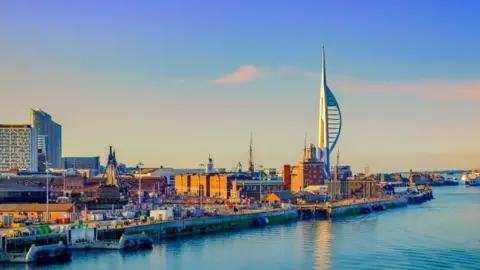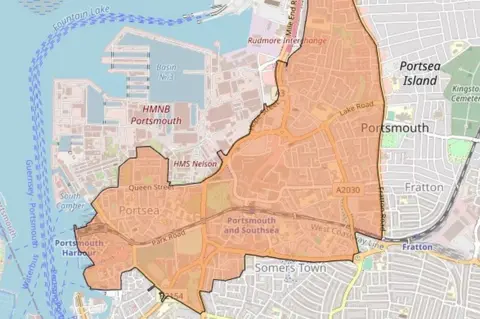Portsmouth Clean Air Zone sees fewer vehicles than expected
 Getty Images
Getty ImagesFewer vehicles than forecast are being charged since the introduction of a city's Clean Air Zone.
Portsmouth's scheme started in November for high-polluting HGVs, buses, coaches taxis and private hire vehicles.
The city council said just 44 vehicles a day were being charged for entering the zone compared to 306 predicted by the government.
High-polluting private hire vehicles and taxis are charged £10, while buses, coaches and lorries face a £50 fee.
The council was issued a ministerial directive in 2020 ordering it to set up the zone because of breaches in nitrogen dioxide levels, and allocated £6.6m to improve air quality.
 OpenStreetMap contributors
OpenStreetMap contributorsPortsmouth City Council leader Gerald Vernon-Jackson said: "The figures for air pollution show that we have almost got to the point where the clean air zone won't be needed.
"There's been fewer vehicles being charged and fewer fines issued and that means it's not going to pay the government back all the money it put in unless it kept it running for years," the Local Democracy Reporting Service reported.
The fall is thought to be due to Covid restrictions and a large number of people upgrading their vehicles in advance of the launch of the scheme. The overall number of vehicles travelling through the area, one million vehicles a month, was also lower than expected.
The clean air zone, due to run until autumn 2023, will remain in place until the city hits legally-binding targets for air quality which the latest figures show it is just short of meeting.
Once this is reached, the government will require a further year of data to be gathered to demonstrate that it can be kept below that level and then the clean air zone can be removed.
Private cars, motorcycles and vans are not included in the daily charges. Automatic Number Plate Recognition cameras are used to spot vehicles that do not meet standards.

Follow BBC South on Facebook, Twitter, or Instagram. Send your story ideas to south.newsonline@bbc.co.uk.